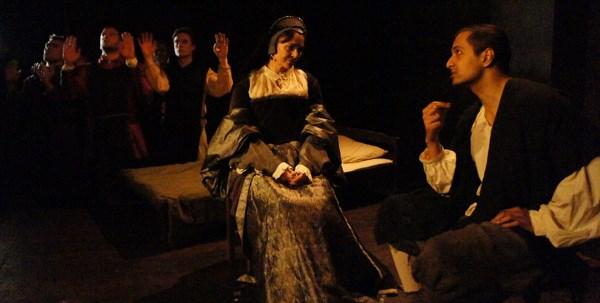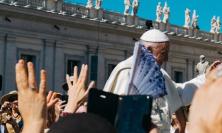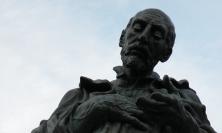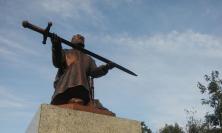James Hanvey SJ found himself captivated by ‘Iñigo’, Jonathan Moore’s new play about the life of St Ignatius, now on stage at London’s White Bear Theatre. This intelligent production explores ‘that strange asymmetry between the life and the achievement’ of Ignatius, and in doing so it issues the audience with a subtle invitation to participate in the drama of divine presence.
The history of the Society of Jesus is filled with drama. The innovative form of the Society’s life – not so much a rule as ‘a way of proceeding’ – meant that the rapidly growing early Society had to struggle to justify itself as a religious order, all the more so because of its range of activities: the establishment of colleges and universities which placed it at the centre of cities and cultures, its energetic work to respond to the Protestant reformation, and all the while bringing new methods and energy to the renovation and renewal of Catholicism.
The Society was conceived as a missionary order and it was natural for it to follow the expansion of the European powers into newly-discovered territories in the Americas and the new economic markets opening up in Asia and the East. To meet the new circumstances it encountered, the Society developed creative techniques and approaches to adapt to the needs of the peoples it sought to engage, sometimes working with but sometimes against the vested interests of traders and imperial governments.
From the beginning, in a tradition that continues today, Jesuits worked at all levels of society: not only in the courts of Kings and Queens, but in slums and prisons; from the new agents of empire to the indigenous peoples in the claimed territories. Many of the Society’s members distinguished themselves not only in the classical fields of scholarship but in the emerging sciences and, on a different plane, they showed that they were not afraid to swell the ranks of the martyrs wherever they were sent. Nor could Jesuits be confined to physical, intellectual or spiritual cloisters. They sought a passionate insertion into cultures which they endeavoured not only to understand but also to shape according to the Kingdom of Christ and the dynamic Christian humanism that they had made their own.
Of course, this great burst of apostolic energy was not without its problems. While drawing many influential supporters it also brought suspicion and opposition. Jesuits were not only viewed as dangerous and political because of their power and influence, but their doctrine, too, was often regarded with suspicion; and although they may have aspired to humility they did not lack confidence in their ability, nor were they notable in shrinking from controversy. In 1773, the papacy suppressed the Society only to restore it again in 1814. Even in present times, the Society has not had its troubles to seek.
What inspired and sustained this remarkable order? It all began with Ignatius of Loyola, or Iñigo, who, despite his own dreams and ambitions, had little significant prospect of being noticed let alone changing history. Here begins the problem with which any writer or dramatist has to deal. Iñigo lacks immediate appeal; he has none of the immediate warmth and attractiveness of Francis of Assisi or Teresa of Avila, nor during his life is he the performer of spectacular deeds – natural or supernatural – that capture the imagination. Indeed, looking at the source documents – the Spiritual Exercises, the Constitutions, the so-called ‘spiritual diary’ and the extensive correspondence – one might be forgiven for finding Ignatius a rather dry personality with evident neuroses and quirks, whose most distinguishing characteristic was a very strong, determined will. Though women do seem to have found him attractive.
While it is not too difficult to turn the history of the Society, or some part of it, into a powerful drama, as The Mission demonstrates, the story of Ignatius is a challenge. Even Cecil B. DeMille would find it difficult to make this life, especially the years in Rome as General, into an epic. Jonathan Moore is perceptive enough not to try, but in ‘Iñigo’ he does begin to explore that strange asymmetry between the life and the achievement.
It cannot be just luck or circumstance that makes Ignatius a major historical and religious figure, one whose influence through the Society and Spiritual Exercises continues to touch incalculable numbers of people and inspire imaginations. The vast imbalance between the instrument and the effect must be the way in which God chooses to work. The very discrepancy itself is the drama; it provides the space in which we glimpse something of the divine nature and presence, the hidden, awesome, loving majesty of the God ‘who labours and works’ in us and for us in all things. The art is not only to entertain us, to make us think or even to inspire; good theatre will do all of this and more. The real challenge is to bring us into the space where we can begin to see and experience what lies at the heart of this discrepancy and come to inhabit it, for a few moments, a few hours or a lifetime. Even when it is an attractive space, it is also dangerous and disconcerting, for we cannot remain merely a member of the audience: we cannot hide.The White Bear Theatre where ‘Iñigo’ is being performed provides an intimate, intense, but convivial space in which it is not really possible to hide. Even though one may not know anyone else, one doesn’t feel anonymous. Not only does this create a sense of sharing as an audience, it allows for a moment of community, of participation, even though nothing is demanded other than to be attentive, open and present. It changes the relationship between actors and audience. There is a sense, then, in which the space of the White Bear is the right space for ‘Iñigo’, both in scale and immediacy. There is no real need for scenery; with characteristic intelligence and wit, a few well-crafted props and costumes, and subtle changes of lighting, music and sound effects, writer/director Jonathan Moore invites our visual and emotional imagination to open to the drama that unfolds, as much interior as exterior.
The first part of ‘Iñigo’ largely follows the different episodes that Ignatius himself chose to record in the Autobiography. In that collection, they are more a series of recollections or instances chosen by a reluctant subject to somehow illustrate a particular grace, rather than an ordered, well-crafted chronology or a story. The Autobiography does not offer easy material to turn into a play, but ‘Iñigo’ manages to overcome hurdles. The ensemble of actors is at its best in bringing energy and technical skill: with engaging and impressive mastery they double and treble parts, making swift, convincing, character changes. Rather than confuse or lessen the impact, the effect is to build a sense of an intense community, living and evolving through its unfolding life and history.
There are subtle continuities such as the blacksmith working at his forge, who is introduced to us at the very beginning. We hear the sound of metal being hammered into shape as the unseen child Iñigo looks on. This imagined child is more than just a clever way of getting round the problem of needing to enlist a young actor, it actually creates space for us: we see as the child sees and hears; we don’t remain outside but are drawn in. When the sound of beaten metal recurs at key moments, we not only have a sense of the continuity of a life but the continuity of God working interiorly with Iñigo’s soul through the relationships and circumstances of his life, fashioning something of beauty which maybe can only be seen after our earthly existence rather than during: a better instrument in the divine hand.
If the action of the first part of ‘Iñigo’ is finding God’s will, the second part is serving it. Act Two stays with the narrative of Ignatius’s life, and largely focuses on his time in Rome when he is becoming the founder of a fledging order. Here the play brings an intriguing speculative dimension to the relationship between ‘Master’ Ignatius and Cardinal Carafa. Carafa is a significant figure of ecclesiastical history in his own right: the founder of the Theatine order, less innovative than the Jesuits but equally committed to reform, Carafa set up the Roman Inquisition and became Pope Paul IV in 1555. Before he became pope, the real-life Carafa knew Ignatius; he was and remained deeply suspicious of the power of Spain and of Spaniards, and he certainly did not approve of the Society’s religious form of life. The prospect of Carafa as pope struck terror in the soul of Ignatius, for he knew it would not bode well for the form and future of the infant order. Ignatius was right.
The relationship between these two obviously provides many dramatic possibilities. What is interesting in Moore’s approach is his focus on the deeper drama of integrity: Carafa recognises Ignatius’s integrity in trying to hold true to God’s call and the vision of apostolic service and holiness which it informs. Neither of these two passionate men is naïve about the ways of the world and the danger of using the realities of worldly power and influences to achieve a good even when it may be divinely inspired. There is always the temptation to embrace the seductive fallacy of the end justifying the means, in which so often power itself becomes the end and not the good that is intended: the politician or Government that only wants to stay in power; the wealthy patron who instrumentalises the objects of their charity; or the guru who makes a spirituality out of their narcissism. There is no limit to the ways in which the prospect of possessing ‘the ring of power’ can stimulate our imaginations. Whatever its form, both Carafa and Ignatius are capable in their different ways of discerning the path of the serpent. In some sense we all recognise it and we all have to face it. Those familiar with the Spiritual Exercises, as is the author of ‘Iñigo’, will recognise this as the drama of the The Two Standards. Moore’s portrayal of the dynamic between Ignatius and Carafa is compelling; and Paul Thomas Lyons, who plays Carafa, beautifully exposes not only the poisonous envy in his soul but also the pain and the deep sense of loss as he recognises in Loyola something he, too, once had, maybe even a God he once had. Not only is this a duel between two personalities touched by God, it is a duel that takes place within their souls. It is a battle for their souls. We can recognise it as the world we all inhabit and it is the dramatic high point of the play.
Of course, the drama revolves around Iñigo and so much depends upon the actor in the title role. It is a demanding part: not simply a matter of competently and engagingly unfolding a story but rather of opening up a whole interior world. This is what Ignatius himself discovered on his sickbed at Loyola and in the crucible-schola of Manresa. With a graced docility to the Spirit, Ignatius came to learn the Holy Wisdom of God’s ‘way of proceeding’, the manner of the Divine Love’s ‘labouring and working’ for us. In turn he became a teacher, allowing God to show him how to guide others who truly want to serve Christ and their neighbour in the great drama of the Kingdom. According to the notes, Fayez Bakhsh who plays ‘Iñigo’ is a young actor at the beginning of his career. He makes the character attractive and carries us through the narrative with commitment and verve. Yet I felt he had not yet found the depth to open up this interior space to us. It is not only about technique, or energy, it is also about finding that emotional intelligence and imagination which gives access to the vast, strange and beautiful dramatic landscapes of the soul. Yet here, too, we may detect another challenge for the playwright and for the actor: for a contemporary, secular audience, finding a way of recovering this imagination may require a new language and type of drama which we are still trying to find. I think ‘Iñigo’ allows us to appreciate that it is a challenge that Ignatius himself would recognise.
The intelligence of the production, and especially the vitality and versatility of the performances make for a moving, stimulating and enjoyable experience. The structure and dynamism of the play, the art with which Jonathan Moore makes Ignatius accessible to us, capturing much of the drama of the Spiritual Exercises themselves, would also make ‘Iñigo’ an excellent discovery for schools and colleges. I hope that is something we may look forward to.
James Hanvey SJ is Master of Campion Hall, University of Oxford.
‘Iñigo’, written and directed by Jonathan Moore, is at the White Bear Theatre, Kennington, until 28 February: http://whitebeartheatre.co.uk/event/details/inigo-by-jonathan-moore/






